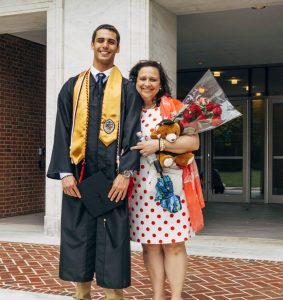
As an undergraduate embarking on his college career, Alexander Schiffhauer, Engr ’13, ’15 (MSE) came to Johns Hopkins with many academic interests—art, medicine, technology. It was the opportunity to explore these various interests that led Schiffhauer to attend Hopkins in the first place.
“I was undecided on my major for a long time, but I knew I would have the freedom to explore my interests at Hopkins,” he says.
The native New Yorker didn’t declare computer science as his major until his junior year, after switching between neuroscience and writing seminars. The classes that won him over were Edward J. Schaefer Professor S. Rao Kosaraju’s Automata & Computation Theory and senior lecturer Peter Fröhlich’s game design courses.
“These courses led to me falling in love with computer science,” Schiffhauer says. “I was hooked on the theory and its applications, as well as how I could bring artistic expression to life through software.”
While obtaining his BA, Schiffhauer continued to explore his other interests with coursework in science, theater, and photography.

Alexander Schiffhauer and his mother after the May 2013 commencement ceremony.
In 2015, he went on to obtain a master’s in computer science from Hopkins.
“I had just started Big Huge Games, a Baltimore-based gaming company, with other Hopkins alumni, and I was looking to take a break from the industry,” he says.
Looking to further his computer science education, Schiffhauer focused on understanding concepts at a deeper level.
“With courses like Principles of Programming Languages, Approximation Algorithms, and Operating Systems, I learned how programming languages, algorithms, and computers work at their most primitive levels,” says Schiffhauer.
Schiffhauer encourages Hopkins students to explore a variety of disciplines before finalizing on a major or career path.
“In computer science, we have these terms called ‘breadth-first’ and ‘depth-first’ searches. Early in my career, I found breadth-first searches to be immensely useful. By initially focusing on breadth, I was able to explore each of my interests through classes, independent studies, and internships. I didn’t rush into the first thing that caught my eye. This exploration-first mindset was instrumental in my development in college and also in my career,” says Schiffhauer.
Now in San Francisco, California, Schiffhauer is the product lead for computational photography at Google, where he has spearheaded projects like the Night Sight and Astrophotography modes on Pixel, which stitch together 15 different photos taken at night to create a bright and vibrant image. He was recently recognized by Forbes as one of its “30 Under 30” in the consumer technology category.